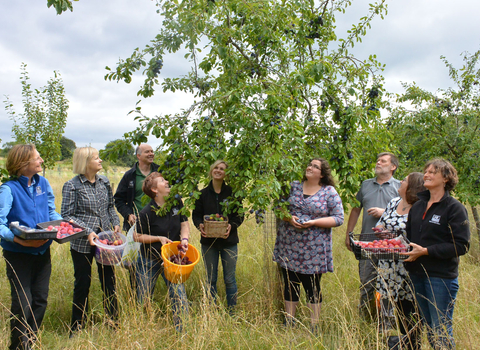Deciding what you would like to do as a career is one of the most difficult decisions you will face and it is not uncommon for people to work in a number of different roles, or indeed in a number of different organisations or even sectors, before finding (or accidently falling into) their ‘dream job’ at a later stage of their working life.
These pages aim to make it as easy as possible for you to access information about some of the different paths available within the charity conservation sector in order to help you decide which, if any, path you wish to pursue.
You’ll find overviews of a range of roles within Worcestershire Wildlife Trust together with some of the backgrounds and journeys of some of the people who currently hold them.
There are hints and tips on how to boost your skill set and knowledge base to help make yourself desirable to higher education institutes and employers!
If you are looking for ways to boost your experience, knowledge base or skill set, please do get in touch with us! Who knows, that could be your first step on your journey to your dream career.
Good luck!!
Do what you enjoy, learn from those around you and take what you can from every opportunity – even the least likely roles will equip you with skills and knowledge for your future.Communications Lead
What is the nature conservation and environment sector?
The nature conservation sector is all about protecting and, importantly, enhancing our natural environment. This can include physically managing landscapes, nature reserves and other habitats as well as species surveys and monitoring. It also includes public interaction and community engagement about wildlife and conservation as well as technical and scientific roles that examine subjects such as climate change and biodiversity.
Who is Worcestershire Wildlife Trust and what do we do?
We are Worcestershire’s leading local wildlife charity and we want our county to be rich in wildlife, allowing people to live happier and healthier lives. We are part of a national movement of 46 Wildlife Trusts across the UK.
- We work with volunteers, local people and land managers to restore, protect and connect wildlife sites across the county for the benefit of wildlife and people.
- We engage and teach people about our amazing natural world, aiming to inspire local people and communities to care about and make space for wildlife.
- We campaign to raise awareness about issues affecting wildlife locally and nationally, working to ensure wildlife is protected - through our planning work, for example.
- We advise others by providing ecological consultancy services to local authorities, businesses and individuals.
Why not explore our website to find out more about what we do - from protecting habitats, project work and inspiring people how to make a difference where they live.
Our jobs and people
What comes to mind when you think of the people who work in wildlife conservation?
There is generally a misconception that to work for an organisation such as the Wildlife Trust you need to:
- Have been mad about wildlife since before you could walk
- Spent your entire childhood outdoors catching frogs (other amphibians are available)
- Obtained a degree in zoology or some other wildlife related subject
- Love being outdoors come rain, wind or shine (mostly rain…)
Although this is the case for a few of our staff (well, maybe not the rain part), our organisation is made up of a huge variety of different people from a diverse range of backgrounds, each bringing their own unique skill sets and life experience to the mix. What unites us is that we’re passionate about wildlife conservation.
Not all roles require practical management or face-to-face engagement skills, many other important roles exist that are vital to keeping nature conservation organisations functioning effectively.
Want to learn more? Follow the links in the boxes below to discover more about how you could play your part in conservation.

